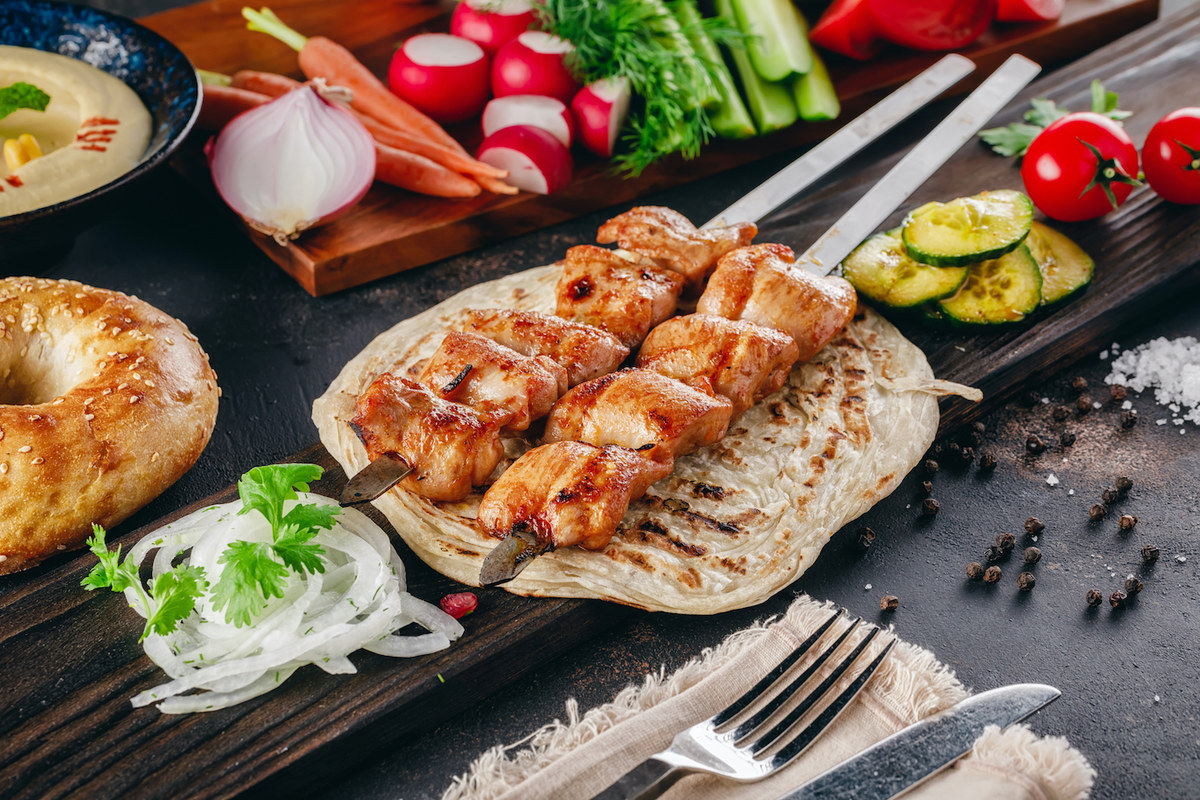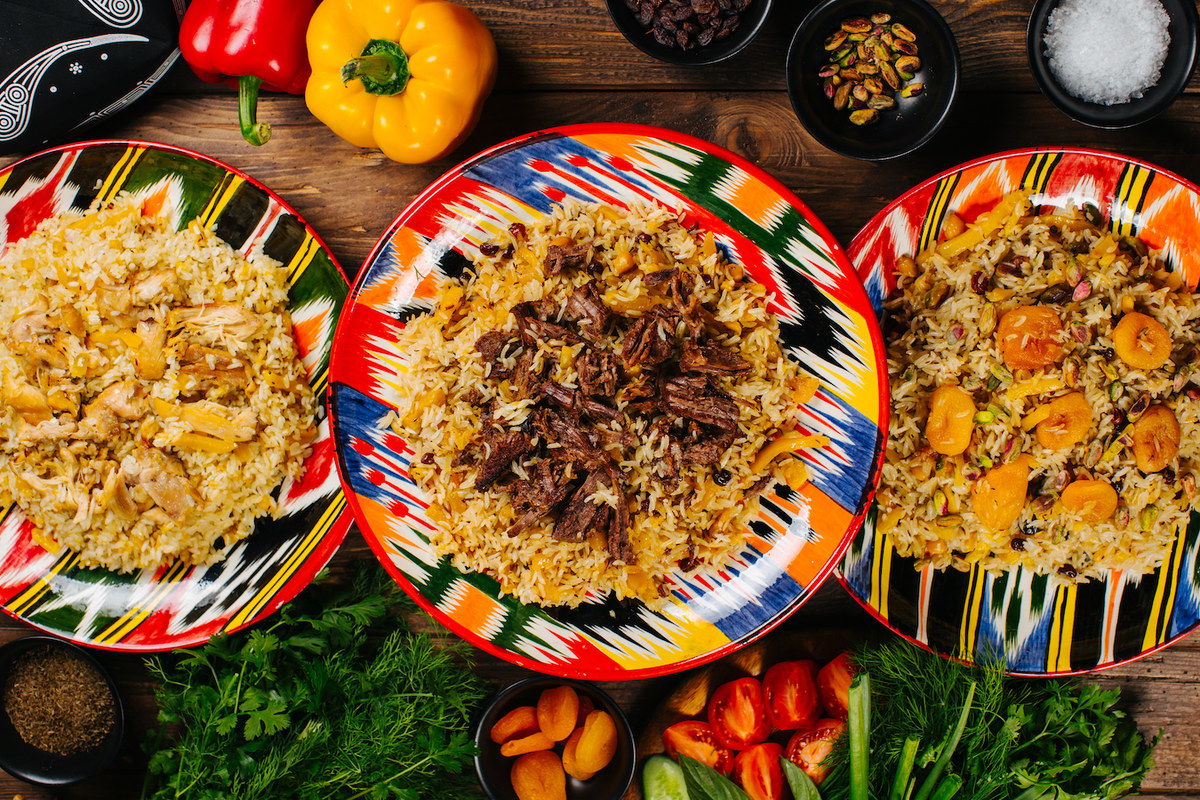DUBAI: An Ecuadorian chef might not be the obvious choice to lead a kitchen serving food inspired by the cuisine of former Soviet republics in Asia, but this is Dubai, after all. And if you’d expect to find that weird kind of cultural mix anywhere, it’s here.
Chef Alejandro Castro — who heads up OSH Restaurant in Dubai’s La Mer development — says it came as something of a surprise to him when he was approached by OSH’s then-head chef to work as a sous-chef at the restaurant, which bills itself as serving “a modern twist of Central Asian and contemporary Uzbek cuisine.”
“Before OSH, I was working in a French restaurant in Dubai,” Castro says. “(The head chef of OSH) saw that I had the basics of French fine-dining, and he told me not to worry that I didn’t know Russian or Uzbek food. He just wanted a person who understood high standards in the kitchen.”

Chicken shashlik. (Supplied)
A year or so later, Castro was promoted to head chef, and it’s fair to say he’s got a much better understanding of Uzbek food now. Although he admits he’s still not quite perfected the ‘plov’ that is a staple of Uzbek cuisine.
“It takes a lot of training,” he says of the rice-based dish (which he’s provided a recipe for here). “The thing you have to get exactly right is the rice, but that goes through so many different cooking procedures in the same pot that you’ve got to get your timings perfect. We have some plov masters in the restaurant who’ve nailed it, and they’re training me now.”
It’s clear from our conversation just how passionate Castro is about his work.
“The cooking world is so beautiful, so challenging, and so full of opportunities every day,” he says. “I hardly know anyone who’s regretted this career, and even those who have have learned so much that has helped them in whatever other career they’ve taken.”
What’s your go-to dish if you have to cook something quickly for yourself?
It’s a very easy chicken sandwich, done with some grilled pineapple, jalapenos, pickled onions and some spicy mayo. Just mix it up, throw the chicken in the pan, and you’re done. Twenty minutes.
What’s your favorite dish to cook?
Many things. (Laughs.) Probably the one that needs the least preparation and that makes me very happy, and everyone else around me very happy — at least I’ve heard no complaints about it — is a shrimp ceviche. It’s got a lot of vitamin C, so it’s very good after a heavy night. No fats, just some of the natural cholesterol from the shrimps, but a lot of orange and lemon juice. Lots of vitamins from the tomatoes, onions and coriander too. And it’s done in a very short amount of time.
What one ingredient can instantly improve any dish?
It’s unpopular nowadays because of some bad press in the Nineties, but it’s MSG. When you think something lacks flavor, that often means it lacks umami flavor and MSG is basically umami in powder form.

Chef Castro says it came as something of a surprise to him when he was approached by OSH’s then-head chef to work as a sous-chef at the restaurant. (Supplied)
What customer behavior most annoys you?
It’s usually the modifiers. Not just for me, but for most cooks. I understand people have their own tastes and want something done a certain way, but the dishes are designed and tested. They work. When I get a complaint about a modified dish, it’s expected. A modified dish won’t be as good, or as thoroughly thought-out, as an original. At the end of the day, though, the guests are our bosses.
What’s the worst mistake you ever made in a kitchen?
Nothing. I’m perfect. (Laughs.) No… One of the biggest ones was when I was a commis-chef and I had a breakfast shift. My head chef always insisted we shouldn’t use the timer on the oven; we had to remember what’s what and how long it’s been there. I remember putting 80 croissants in the oven and forgetting about them. Once I’d remembered, I opened the oven, a lot of smoke came out and I had 80 perfect pieces of charcoal. It was horrible. I was mortified. I thought I’d be fired that day. But after you have a big mess-up like that, then never again.
What are you like in the kitchen? Are you a shouter? Or are you quite chilled-out?
I’m both. On a normal day I’m quite laidback, I like to have music in the kitchen — my team can also choose the music; something that gets them into the rhythm of working. It’s such a stressful and physically demanding environment, so you need something that pulls you through the day. And I’ve found that, for me, that’s music. And my team know they can approach me with whatever issue they may have. We really get to know each other, and we hang outside of work even. We try to keep a peaceful environment — we joke around a lot — I can probably say I’m the main prankster in the kitchen. I might hide stuff from them, or tell jokes. In terms of discipline, though, they know that when it’s cooking time, it’s cooking time. We’re here for a purpose, and if that purpose isn’t met then we’re not doing our job. So there’s happy time most of the time, but sometimes, when it gets too relaxed, then there’s not-very-happy time. I love my team, but they know that when it’s showtime, it’s showtime.
Chef Alejandro’s Osh Pradznichny with Achichuk salad

Uzbek rice pilau and lamb with tomato salad. (Supplied)
INGREDIENTS
For the main dish
650 gm lazar or basmati rice
50 gm chickpeas
250 ml sunflower oil
750 gm lamb leg, boneless
250 gm white onion, sliced
850 gm yellow or baby carrot, cut into long pieces
1500 ml water
3 gm cumin seeds
12 gm salt
50 gm yellow raisins
5 quail eggs
For the salad:
500 gm tomato
350 gm red onion
25 ml olive oil
5 gm salt
1 gm pepper
1 gm basil
INSTRUCTIONS
1. Wash the rice in cool water and soak the chickpeas the night before.
2. Heat oil in a heavy-bottom pot or kazan (traditional Uzbek iron cast pot), until it begins to smoke, then cook the lamb leg in it until brown. Remove the lamb and add the onion. Repeat the process for the carrot. Finally, add the lamb and onions. After five minutes, add water, cumin and salt. Check the seasoning, then add rice. Add the raisins and the chickpeas. Cover and place on medium heat.
3. Hard boil the quail eggs, then peel and halve.
4. Once the rice has absorbed all the liquid, give it a quick mix in the same pot, making sure everything is cooked al dente.
5. Serve on a big sharing platter with the halved quail eggs around the rice.
6. For the salad, slice tomato and onion. Toss with olive oil, salt, pepper and chopped basil. Serve on the side of the rice.





















